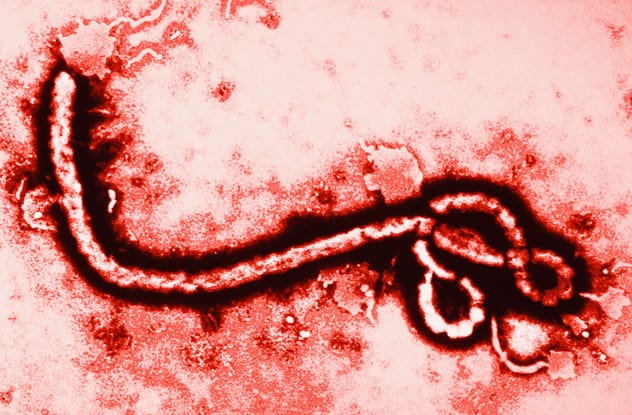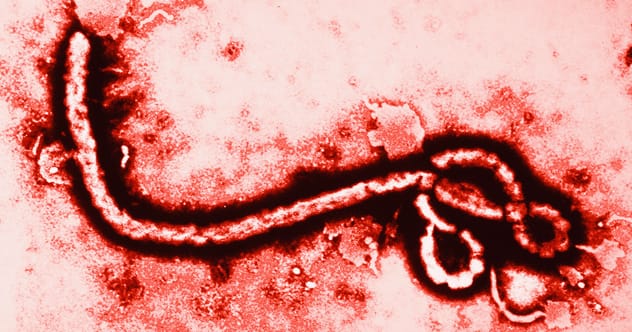Have you seen the headlines? It feels like the end of the world is knocking at our door. News outlets across the globe are buzzing about Ebola, painting it as a super-virus destined to outdo historical plagues. They speak of horrific symptoms and imminent global disaster.
But is the picture truly that grim? Dig a little deeper, and you’ll find the threat, especially to Western nations, has been significantly exaggerated. While Ebola has caused immense suffering in parts of Africa, it’s far from the worldwide catastrophe some media outlets portray. Let’s look at the facts.
10. It’s Almost Impossible To Catch

Remember the Spanish flu of 1918? It rapidly infected a third of the planet. Its high transmission rate made it spread like wildfire. Can Ebola do the same?
The short answer is no. Ebola is surprisingly difficult to contract. You need direct contact with the bodily fluids of an infected, symptomatic person entering your body through broken skin or mucous membranes (like eyes, nose, or mouth). Theoretically, you could even touch infected blood and be safe, as long as you have no cuts and wash thoroughly.
What about everyday fluids like saliva or sweat? The World Health Organization (WHO) states the live virus hasn’t been found in sweat. Saliva only becomes infectious in the very late stages of illness. You’d practically need to be kissing a severely ill patient. Mosquitoes also can’t transmit Ebola between humans.
Ebola is so hard to catch that sitting next to an infected person on a plane for hours likely won’t transmit the virus. In one instance, a sick passenger vomited on a plane, yet no other passengers got sick.
9. The Transmission Rate Is Laughably Low

Scientists use the basic reproductive number (R₀) to measure how contagious a disease is. It tells us how many people one infected person is likely to infect in a population with no immunity. HIV’s R₀ is around 4. Measles, highly contagious, has an R₀ of 18. Ebola? Its maximum R₀ is estimated between 1.5 and 2. This means, without any intervention, one infected person would likely infect only one or two others.
While even a low rate can spread if unchecked, the R₀ in Western countries is likely lower than the maximum. Ebola spreads best where medical care is poor and burial customs involve close contact with bodies. Countries with good medical systems have a massive advantage. Simple isolation is key; you can effectively stop the spread with just a sealed door.
By following standard infectious disease protocols used for decades, Western nations are almost certain to contain Ebola.
8. It Won’t Become Airborne

The scariest thought is Ebola mutating to spread through the air. While scientists say it’s highly unlikely, viruses do mutate. So, is airborne Ebola possible?
Technically, maybe, but it would defy everything known about virus transmission. The WHO confirms zero evidence of airborne Ebola, ever. No known virus has ever dramatically changed how it spreads. Even rapidly mutating viruses like HIV and influenza haven’t switched their delivery methods. Ebola mutates much slower than those.
Could it spread via coughs and sneezes, like the flu? Also very unlikely. Scientific American explains Ebola doesn’t multiply enough in the lungs or throat for sneezes to be infectious. Ebola also doesn’t typically cause cold-like respiratory symptoms. Furthermore, respiratory viruses spread globally very quickly. If Ebola had gone airborne, we’d know by now.
7. If It Does Mutate, It’ll Probably Become Milder

It sounds strange, but viruses often evolve to become less deadly. The most successful viruses, like HSV-1 (herpes simplex), linger dormant in your system for years, allowing them to spread widely. HSV-1 infects up to 90% of older Americans.
Compared to such evolutionary winners, Ebola is inefficient. It kills its host so quickly that it limits its own ability to spread. The idea that it would naturally mutate to become *more* dangerous goes against the principles of natural selection.
If Ebola were to mutate successfully, it’s far more likely it would become milder. This would allow it to spread to more hosts, an evolutionary advantage for the virus. For humans, this means the virus would become significantly less lethal. So, an Ebola mutation might actually lead to fewer deaths, not more.
6. There’s No Infectious Incubation Period

A scary aspect of many viruses is the incubation period – the time between infection and symptoms. During this period, some diseases, like the flu, are contagious. You can spread the flu without even knowing you’re sick. Thankfully, Ebola doesn’t work this way.
The WHO confirms that Ebola patients are not contagious until they show symptoms. Even if you were exposed to someone the day before their Ebola symptoms started, you wouldn’t get infected. This is crucial for controlling outbreaks. Because symptoms are usually severe and noticeable, health officials can trace the contacts of an infectious person and isolate them if necessary.
As another positive point, the virus stops being infectious once symptoms disappear. The chance of catching Ebola from someone who has recovered is almost zero.
5. The Number Of Cases So Far Is Tiny

Think back to the swine flu panic in 2009. Many feared it would wipe out humanity. Despite spreading globally, it infected over 60 million people in the U.S. alone, yet the country handled it. Given that outcome, how widespread must Ebola be to cause the current level of alarm?
At the time this original analysis was written (late 2014), the worldwide total was around 8,000 cases. While every case is a tragedy, this number highlights how slowly Ebola spreads compared to other diseases. Spain and Senegal reported only single infections with no deaths. Even the U.S., which sadly saw a death, had only three confirmed cases at that point.
For context, the bubonic plague infects about seven Americans each year, on average. Yet, we haven’t seen a repeat of the Black Death.
4. We’ve Survived It Before

In 2008, an American woman unknowingly carried the deadly Marburg virus, a close relative of Ebola with similar symptoms and fatality rates, after a trip to Uganda. As symptoms emerged, she potentially exposed around 260 people. How many got sick?
Zero. She recovered and didn’t infect anyone else. She wasn’t even diagnosed until months later.
Similarly, a woman in the Netherlands contracted Marburg after visiting the same area. Despite 64 people being identified as high-risk contacts, no one else was infected.
These aren’t isolated incidents. Every Marburg case reported in the West resulted in minimal spread. A 1975 outbreak in Johannesburg infected only three people (one death). Even the 1967 scares in Frankfurt and Belgrade infected only 31 and killed seven. This happened when knowledge of the virus was limited and medical practices less advanced, yet it killed fewer people than asthma typically does in a single day.
3. Our Infrastructure Is Excellent

What do Sierra Leone, Guinea, and Liberia, the epicenters of the 2014 outbreak, have in common besides Ebola? Sadly, extremely poor medical infrastructure. Healthcare in these nations faces immense challenges. Patients might share beds, two or three at a time. Basic necessities like water and electricity are often scarce. Safety precautions may not be followed, and treatment depends on affordability. In Liberia during the crisis, many hospitals lacked basic protective gear and sufficient staff. In such conditions, Ebola thrives.
Now compare that to Western healthcare. Countries like Germany designated entire hospitals specifically equipped to handle Ebola. The UK’s health system was considered robust enough that officials predicted cases would remain in single digits. In the U.S., the CDC implemented numerous measures to prevent spread. With well-funded, high-quality hospitals and established protocols, the idea of Ebola overwhelming Western cities seems highly improbable.
2. We May Already Have A Vaccine

Back in 2005, a vaccine was developed that successfully stopped Ebola in monkeys, even after infection. Due to lack of funding for Ebola research at the time, it didn’t proceed to human trials. However, in 2009, it was given to a German lab worker who accidentally pricked herself with an Ebola-contaminated needle. It’s uncertain if she was ever infected, but the vaccine caused no harm and might have saved her.
This isn’t the only potential treatment. According to experts like Professor Jeremy Farrar, several candidate treatments and vaccines were in development. While not ready for widespread use by normal standards, in life-or-death situations like those faced in West Africa, using these experimental options becomes a serious consideration.
1. The Threat Is Just Media Panic

So why all the intense focus on a virus that experts agree will almost certainly burn out without causing mass casualties in developed nations? Why do headlines sometimes suggest health officials are lying and catastrophe is imminent? One simple reason: Fear sells.
Looking back at past pandemic scares, the media often focuses heavily on the worst-case scenarios. During the SARS outbreak, one headline screamed “SARS more serious than AIDS,” warning of a billion cases. In reality, there hasn’t been a single SARS case globally since 2004. When swine flu emerged, some reports predicted 120 million deaths. In the UK, the panic arguably caused more disruption than the disease itself, nearly overwhelming health services despite a relatively low death toll.
People are often drawn to alarming news. Sensational headlines generate clicks and views. News outlets compete for attention, sometimes leading to increasingly scary coverage.
While future pandemics are possible, the evidence suggests this Ebola outbreak wasn’t the global apocalypse some feared. Understanding the facts can help counter the hype.
Ebola is undoubtedly a dangerous disease that caused terrible suffering, particularly in West Africa. However, based on how it spreads, its relatively low transmission rate, the strength of Western healthcare systems, and historical context, the risk of a widespread, devastating outbreak in developed nations remains extremely low. Staying informed with facts, not fear, is crucial.
What are your thoughts on the Ebola coverage? Share your perspective in the comments below!










